Summary: Aircall is a basic, user-friendly business phone system for small in-house teams currently struggling with high daily call volumes, an inefficient sales process, and constant app switching. Dialpad AI Voice is an all-in-one call center and unified communications platform that combines voice calling, SMS, video conferencing, and collaboration tools in one interface.
Aircall and Dialpad offer cloud-based call center software with extensive third-party integrations, scalable pricing, and AI-powered features that empower agents. But which one is the right fit for your agents, customers, and overall business needs?
This Aircall vs Dialpad comparison outlines each provider’s pricing and plans, features, integrations, security, customer support process, and overall user experience.
- How We Compared
- At A Glance Overview
- Pricing and Plans
- Feature Comparison
- Integrations and APIs
- Customer Service, Security, and Reliability
- AI Capabilities
- Pros and Cons
- Which to Choose?
How We Compared Aircall vs Dialpad
We independently researched and tested both providers, read user reviews and product guides, and used product demos/tutorials when comparing Aircall vs. Dialpad. We then developed the below categories used to evaluate both providers:
- Pricing and Plans: We compared each provider’s available plans and their associated pricing, evaluating overall value, free trial length, add-ons, and included features
- Features: We reviewed and compared each platform’s key features, including voice calling, call recording, analytics, SMS/MMS texting, and team collaboration tools
- Integrations: We researched which third-party platforms each provider integrates with, including popular CRM systems, analytics tools, collaboration apps, and more
- Security and Customer Support: We reviewed each provider’s guaranteed uptime and network reliability, security certifications, customer support channels and availability, and priority support options
- User Experience: We evaluated the top pros and cons of each platform and determined the types of businesses and end users that would benefit the most from each solution
Aircall vs Dialpad: At A Glance
Aircall is a great fit for small businesses that want to streamline/integrate all their existing business communication and collaboration tools into a beginner-friendly cloud phone platform. Dialpad AI Voice (Dialpad’s business phone solution) benefits growth-oriented call centers that need built-in collaboration tools and real-time AI insights that improve CX.
The comparison table below provides a quick summary of Aircall vs Dialpad.
| Aircall | Dialpad AI Voice | |
| Pricing | 3 plans from $30-$50+/license/month | 3 plans from $15-$25+/user/month |
| Best For | Small teams that want an easy-to-use business phone system with pre-built integrations, an outbound power dialer, and an IVR call flow designer | Hybrid medium-to-enterprise call centers needing extensive features, a robust mobile app, and high-level AI automaton to boost productivity and CX |
| Key Voice Calling Features |
|
|
| SMS/MMS |
|
|
| Collaboration Tools |
|
|
| Integrations | 120+ integrations including Salesforce, Microsoft Teams, Freshdesk, and HubSpot | 50+ integrations including Zoom, Google Workspace, ServiceNow, and Zoho CRM |
| Analytics | Real-time Activity Feed, call logging, interactive historical reports with Ananlytics+ | QoS reports, call logs, call volume trends |
| Uptime | 99.95% | 100% for Enterprise customers |
| Customer Support | 24/5 phone, email, chat support | 24/7 phone and chat support |
Aircall vs Dialpad: Pricing and Plans
Summary: Dialpad offers a stronger value than Aircall with its plans starting at just $15/user/month, compared to Aircall’s $30/user/month starting price, both come with a three-user minimum. Dialpad’s pricing is overall more affordable across all tiers and comes with more features at a base level, but there are fewer add-ons.
Aircall Pricing
Aircall pricing starts at $30/licence/month for their Essentials plan, with a three-seat minimum. It comes with a 7-day free trial. Monthly and annual plans are available with a 25% discount for the annual offerings. Add-ons like AI summaries and advanced analytics run up the costs.
To get access to advanced features like PowerDialer, call monitoring, smart call routing, and Salesforce integration, users need to upgrade to their Professional plan at $50/license/month. For a top-tier option, the quote-based Custom plans include outbound international calling, enterprise-level support (like SSO and API access), and deeper analytics.
Aircall offers more à la carte options than Dialpad, like the AI add-on at $9/license/month and Analytics+ add-on at $15/license/month. Aircall is much more customizable, but starts at a higher price point and demands user minimums making it a harder sell for budget-oriented teams.
Dialpad Pricing
Dialpad pricing for AI Voice starts at $15/user/month on the annual plan for the Standard, a big plus for smaller businesses. This tier already has the essentials like unlimited calling, real-time transcriptions, call routing, video conferencing, SMS/MMS, and 24/7 live support.
Going up to the $25/user/month Pro plan adds international SMS, QoS reporting, call hold queues, and richer integrations with cornerstone apps like Slack and Salesforce. The Enterprise plan is quote-based but requires 100-user minimum and includes unlimited ring groups, a 100% uptime SLA, a dedicated account manager, and SSO.
Dialpad offers a limited range of add-ons compared to Aircall, including extra phone numbers, additional conferencing lines ($15/number/month), and faxing ($10/number/month). The base features are far stronger than Aircall’s at lower tiers, making it a better cost-effective solution.
Aircall vs Dialpad Feature Comparison
Below, we directly compare Aircall vs Dialpad voice calling, text messaging, call recording, collaboration, and analytics tools.
Voice Calling Features
Summary: Aircall offers only basic voice calling features like call queues, virtual voicemail, call routing, and customer callback--but its SmartFlow Editor tool provides high-level call flow customization. Dialpad has more advanced routing strategies and VoIP calling features like screen sharing, call queue customization, unlimited ring groups, call park, call flip, and a Dial by Name directory.
Aircall and Dialpad are strong voice calling platforms, but they excel in different spaces. Aircall provides local and toll-free numbers in over 100 countries, alongside vanity numbers and a visual Smartflow Editor that makes mutli-level IVR call flows a breeze. Dialpad offers more flexibility for operations needing complex telephony through number porting, custom caller IDs, unlimited office locations, and extension dialing.
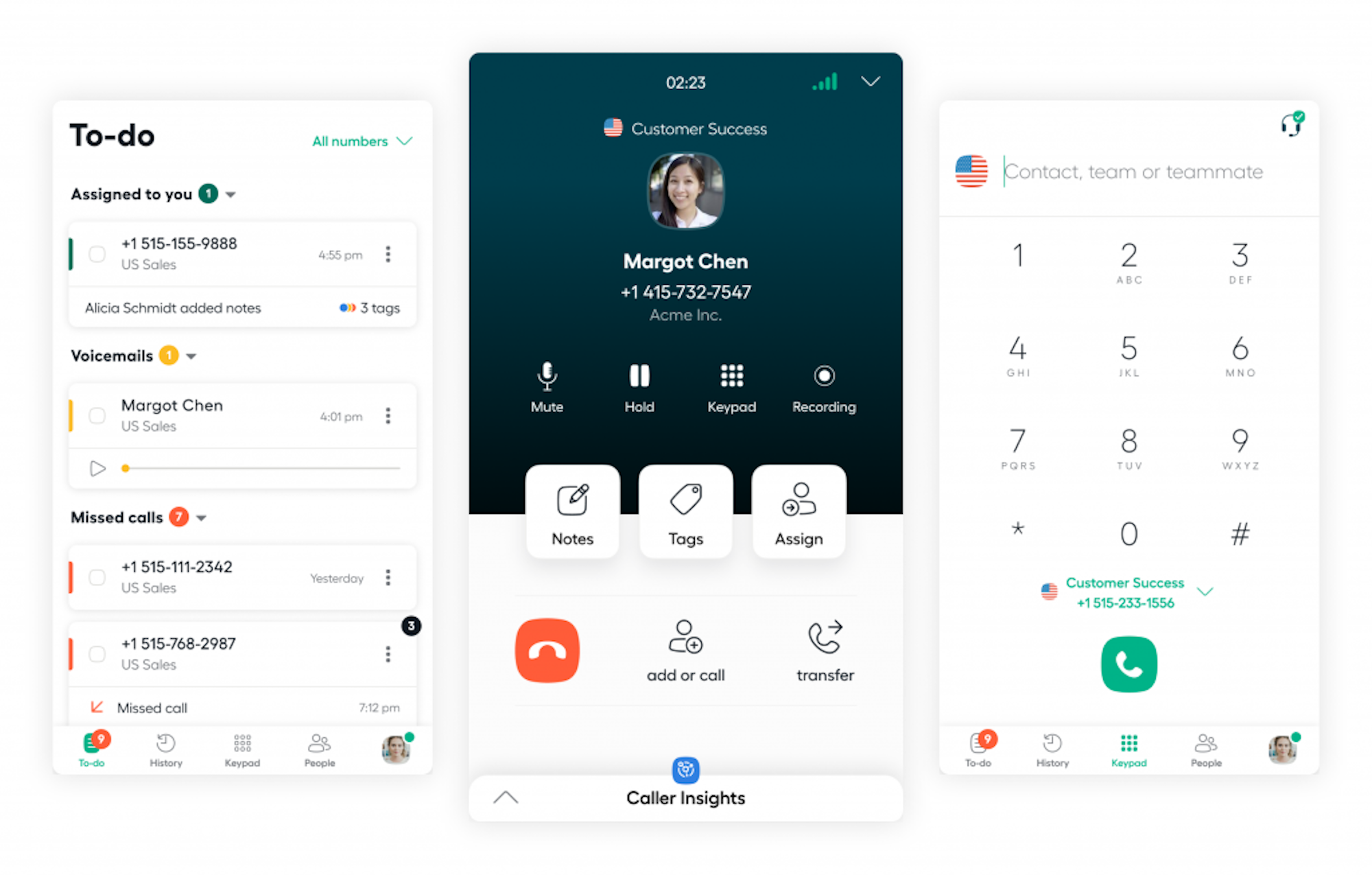
In terms of routing and queue management, Dialpad and Aircall offer advanced strategies like time-based, skills-based, and simultaneous ringing. Aircall grants uses nuanced routing rules like holiday-specific logic and a unique “Respect Queuing Time” setting. Though Dialpad offers more robust call queue controls like a higher queue limit of 50 callers, real time position updates, and the ability to leave the queue for voicemail. Aircall locks unlimited ring groups behind their Aircall Teams tier.
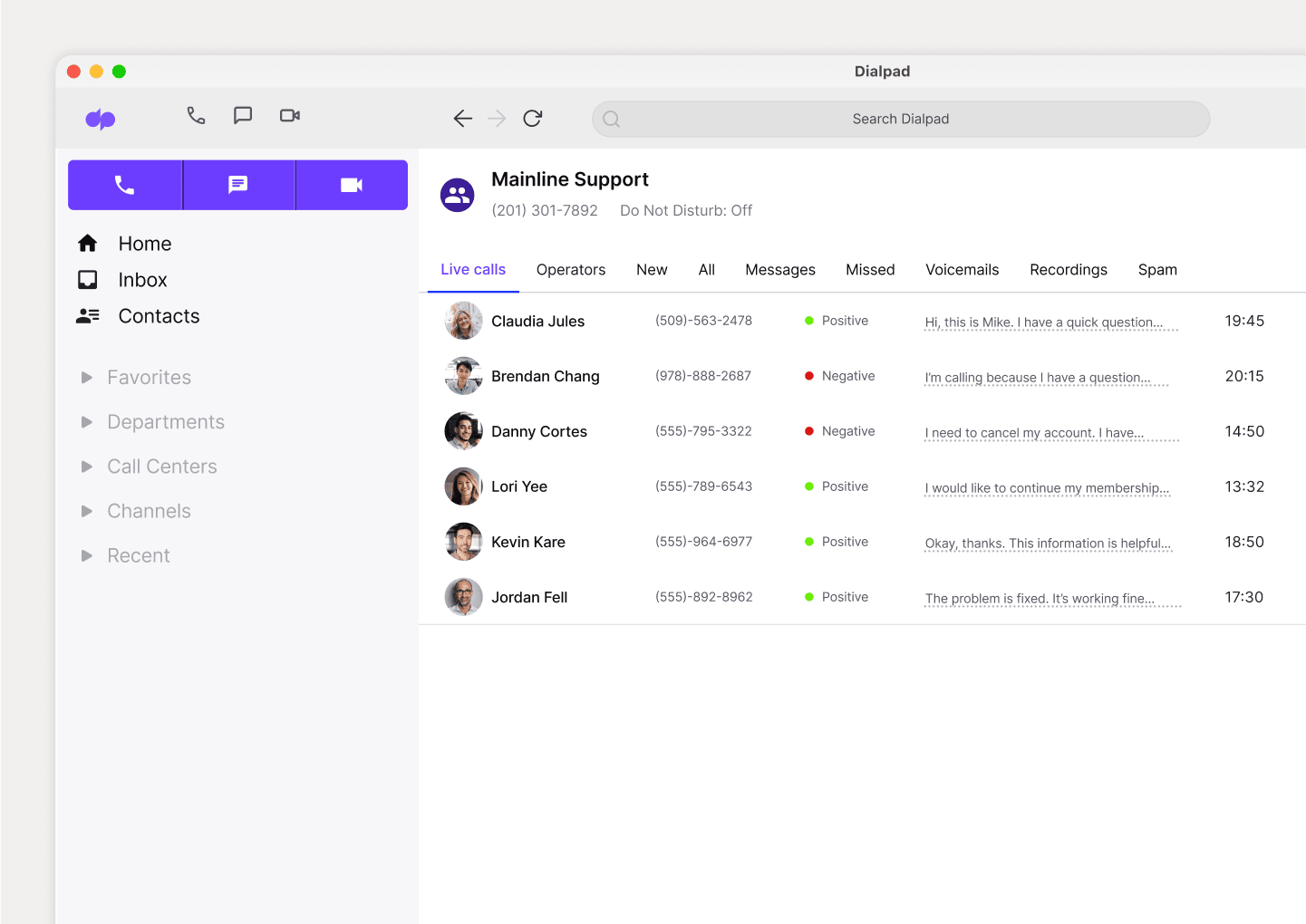
Where Dialpad breaks away is in active call management and agent tools. Dialpad includes, call flip, three-way calling, real-time call whisper coaching, dynamic transfers and in-call screen sharing. Aircall lacks these tools and is instead ideal for teams focused on global number coverage and visual call flow customization. Dialpad is stronger at in-call features and routing overall.
Winner: Dialpad
Dialpad wins for its more advanced voice calling capabilities, including features like unlimited ring groups, screen sharing, call flip, and intelligent call routing. These tools give teams greater flexibility and control during both inbound and active calls.
Business Text Messaging
Summary: Aircall provides unlimited 1:1 inbound text messaging in the US and Canada, 13000 outbound SMS segments/month, and limited international texting. Dialpad includes only 250 inbound and outbound SMS/MMS messages per month, but provides better international texting coverage and group texting.
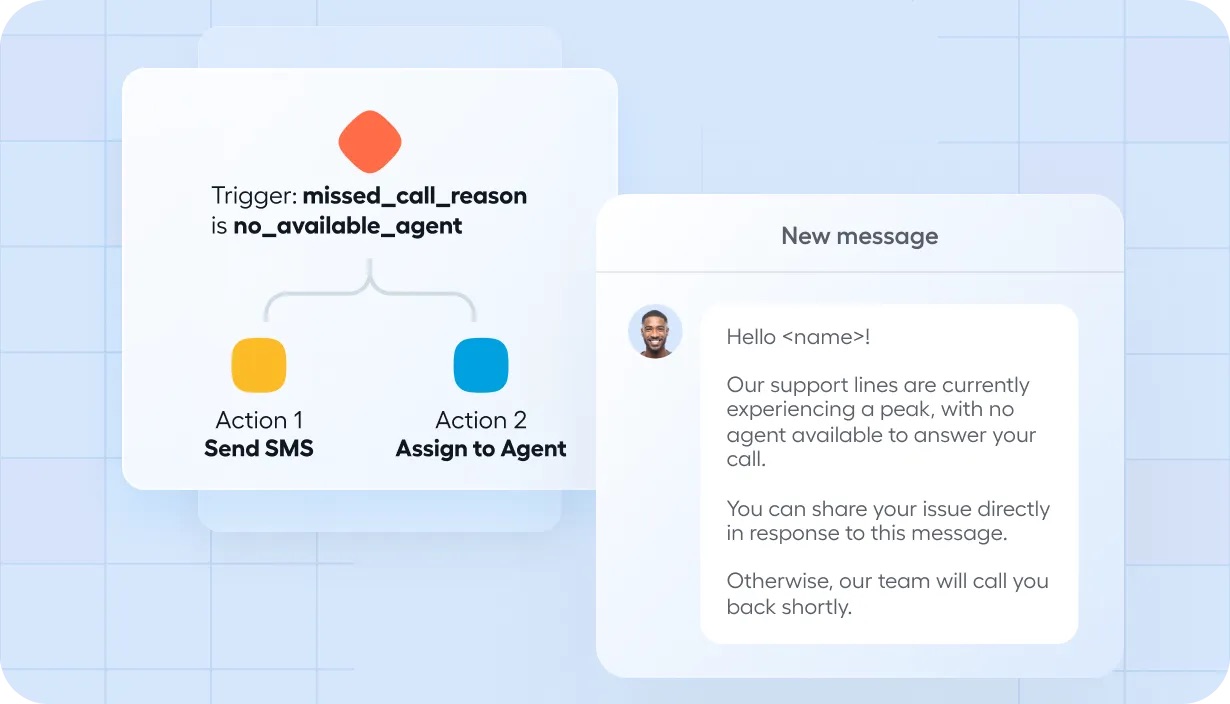
Aircall offers unlimited inbound SMS/MMS business text messaging for desktop and mobile devices in the US and Canada but only allows for 13000 outbound text message segments per month. Users can review conversation history, share PDFs/images preview attachments, and enable push and badge notifications. Aircall does not offer group texting, but users can access advanced business texting and bulk SMS marketing tools via a paid add-on from Aircall partner Heymarket. International texting is available only in the US, Canada, the UK, France, and Australia.
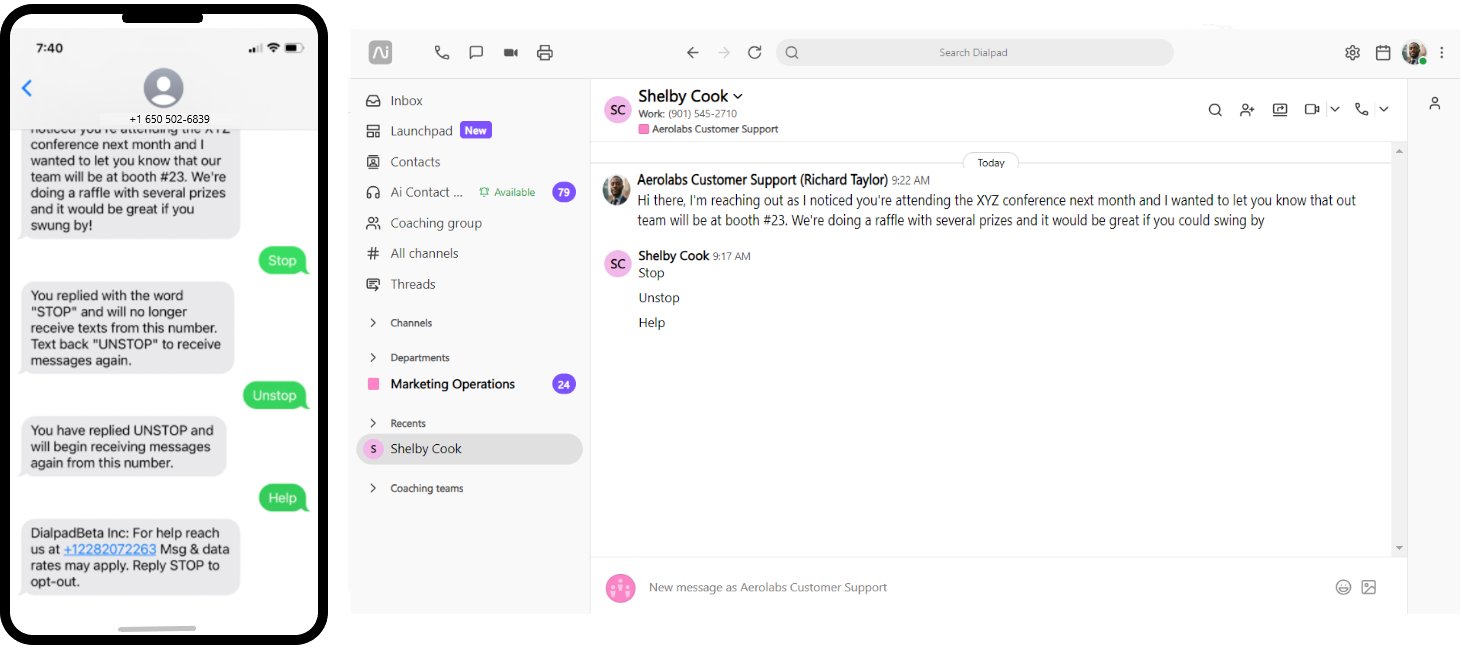
Dialpad includes free unlimited user-to-user SMS/MMS messaging on all plans, but provides only 250 inbound and outbound SMS/MMS messages per month on all plans. After that, all messages are charged on a per-text basis. International texting is available in Users can share images, videos, multiple file formats (PNG, MPEG, AVI, TIFF, JPG), and favorite or forward messages. Admins can enable message delivery receipts, activate shared line messaging, and search message history. Group texting for 25 internal participants and 10 external/internal participants is also included, as is international texting to dozens of countries (international rates apply.)
Winner: Dialpad
Dialpad wins for its broader international texting coverage and built-in group messaging features, which offer greater flexibility for global teams. While its monthly message cap is lower, its advanced messaging tools make it a more versatile option overall.
Call Recording+Transcription
Summary: While all Dialpad and Aircall plans include call recording and transcription, Dialpad offers real-time recording plus AI call summaries, key moments, sentiment analysis, and suggested action items. While Aircall offers some AI recording tools, including call summaries and talk-listen ratios, they’re only available as a paid add-on.
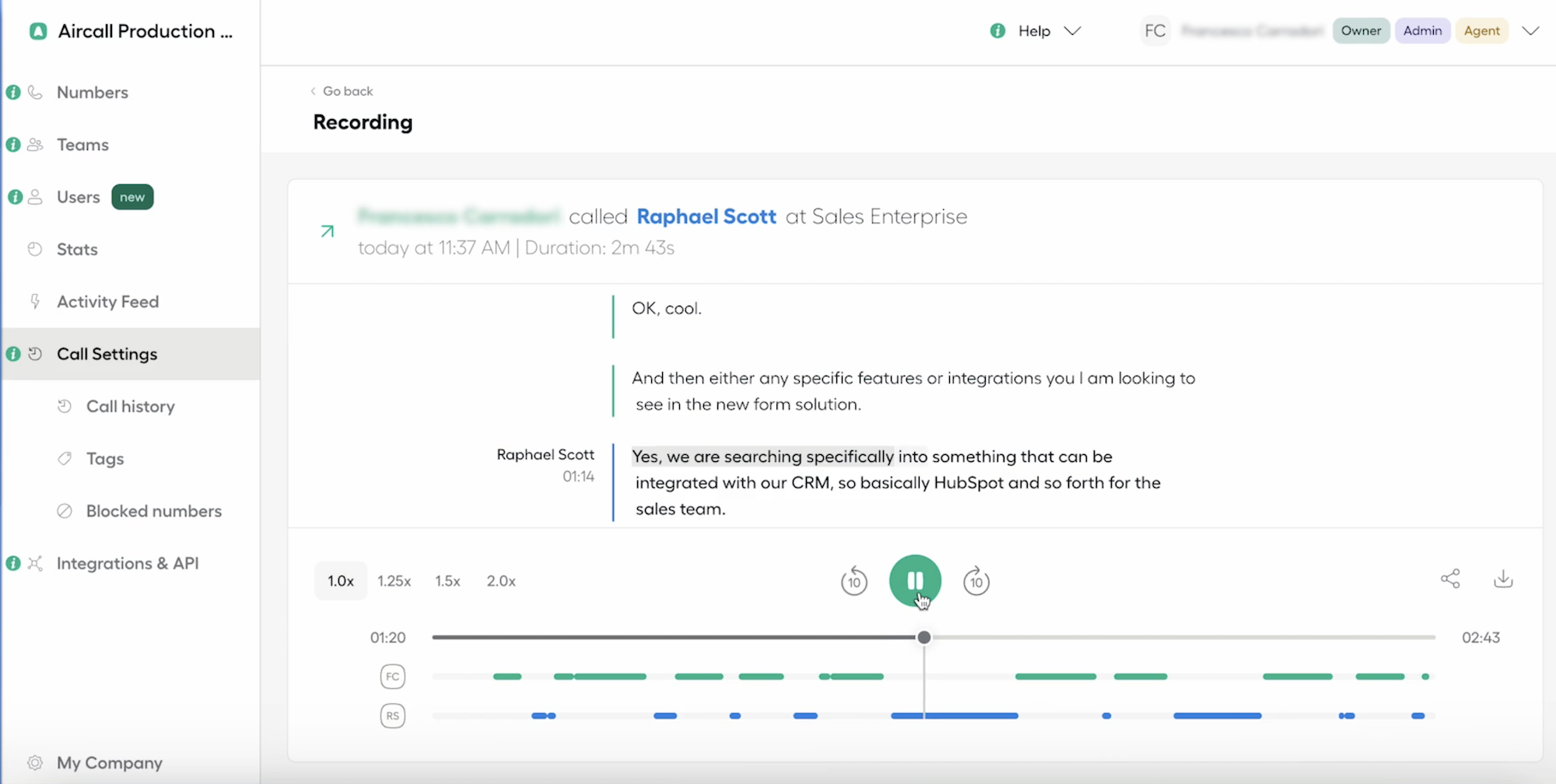
All Aircall plans include call recording and transcription with at least 6 months of call recording storage (Custom Plan users enjoy unlimited call recording access.) Users can pause and resume active call recordings, share recordings, and download mp3 audio files of recorded calls. Recordings are accessible directly in the Conversation Center interface, or in integrated CRM systems.
With the Aircall AI add-on, users can also review call summaries, share recording and transcript snippets, increase playback speed, fast-forward and rewind recordings, and configure transcription rules for individual extensions. AI-powered call transcripts also include speaker differentiation, key conversation topics, and talk-listen ratios that show percentage breakdowns of agent and customer talk time. Transcripts are available directly after the end of a call.
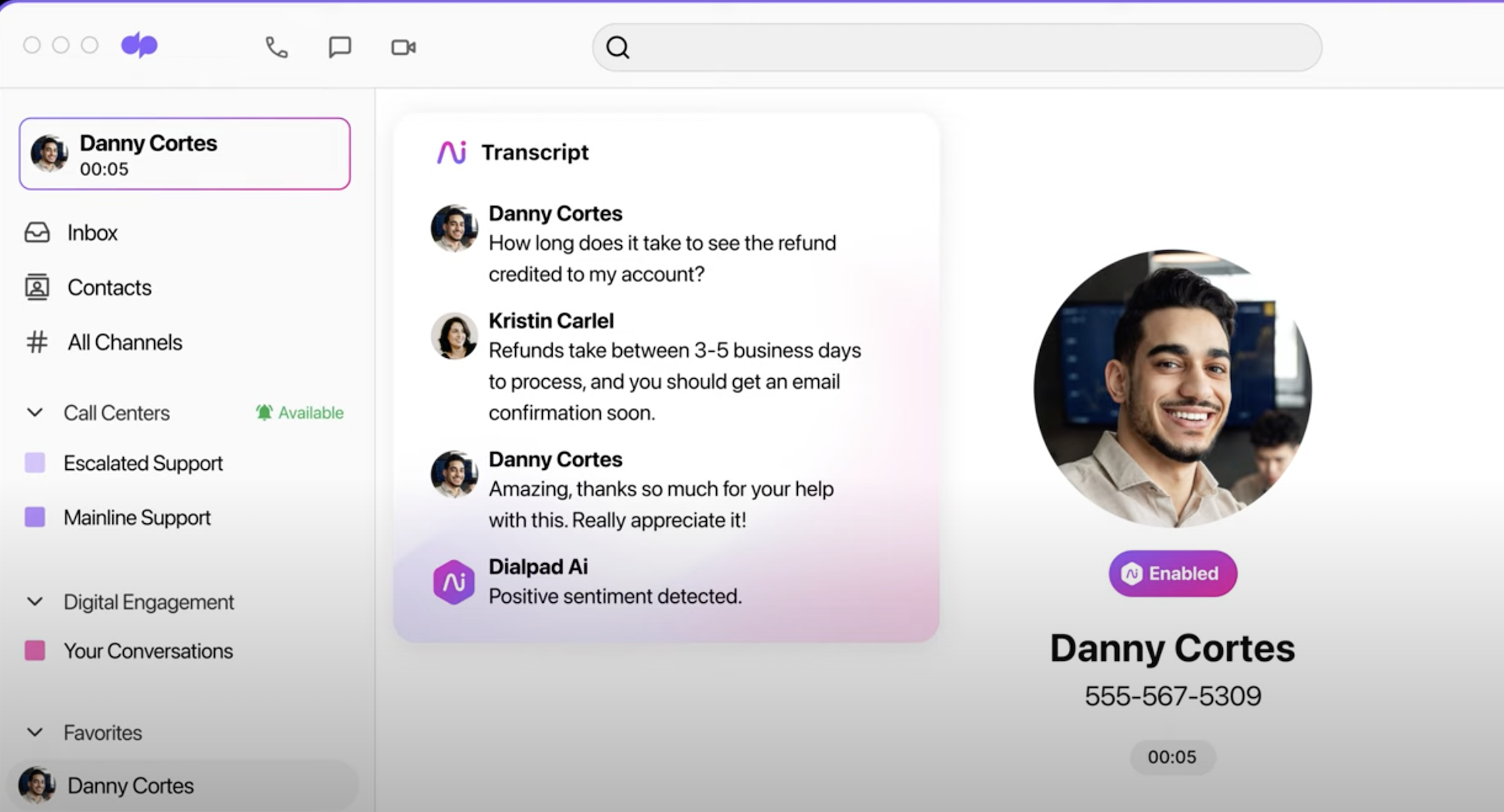
All Dialpad plans also include call recording and transcription. However, unlike Aircall, Dialpad provides real-time AI call transcription with speaker differentiation, call summaries, key moments, sentiment analysis, suggested action items, and more. Users can search and edit call transcripts, listen to call recording audio, and add time-stamped comments to call transcripts and audio recordings.
Dialpad users can review, download, and share call recordings from the Call History tab and the Agent Inbox.
Winner: Dialpad
Dialpad wins for its built-in, real-time AI transcription and post-call insights like sentiment analysis and action items which are features Aircall only offers through a paid add-on. This makes Dialpad more efficient for teams that rely on AI to improve call quality and streamline follow-ups.
Collaboration Tools
Summary: Dialpad easily bests Aircall when it comes to team collaboration tools, as Aircall’s collaboration tools only include conference calls, call tags/assignments, and a shared inbox. In contrast, all Dialpad plans include video conferencing, whiteboarding, file sharing, team chat messaging, and more.
Aircall offers an array of tools to support collaboration. While they are not advanced in the way Dialpad’s are, they offer functionality to teams who appreciate the built-in features like:
- Conference Calling: Aircall includes instant and on-demand conference calling for up to 5 total participants, but conference calling is not available on iOS mobile devices. During conference calls, hosts can remove participants, put the call on hold, view call participants, end the call for all, and add call tags/comments
- Call Tagging: Aircall includes custom and mandatory call tagging with color-coded tags, automatic synching across integrated apps, and filtering
- Shared Inbox: Team-wide inboxes let several agents simultaneously view and manage call assignments, tasks, notes, tags, voicemails, recordings, and follow-up calls
- Call Comments+Assignment: Aircall doesn’t include native team chat, but agents can still collaborate by adding call comments, tagging other users, assigning calls, and by using the warm transfer feature
Dialpad’s robust set of collaboration tools make it a stronger offering than Aircall for those looking for a built-in suite. These tools include the following:
- Dialpad Meetings: Dialpad offers on-demand/scheduled 5-hour video meetings for up to 10 participants. Users can access in-meeting chat, desktop/mobile screen sharing, virtual backgrounds, and unlimited meeting recording, always-on huddle rooms
- Team Chat: Dialpad offers persistent and in-meeting chat with audio-only chat rooms, message threading, file sharing, conversation favorites, a message search bar, message forwarding, and more
- File Sharing: In-meeting and in-chat file sharing with Google Drive integration, real-time co-editing
- Whiteboarding: In-meeting and persistent whiteboarding powered by Miro, pin files/images, add sticky notes, access pre-made whiteboard templates, save/edit/share whiteboards
Winner: Dialpad
Dialpad wins for offering a full suite of built-in collaboration tools like video meetings, team chat, whiteboarding, and file sharing which are features that go far beyond Aircall’s limited support for conference calls and call tagging. This makes Dialpad a stronger all-in-one platform for team communication and productivity.
Analytics+Reporting
Summary: Both Aircall and Dialpad leave much to be desired when it comes to real-time and historical call analytics. However, Aircall at least offers a Live Activity Feed with an overview of current statuses and call queue lengths, while Dialpad doesn’t include any real-time analytics with its AI Voice solution.
Dialpad Analytics
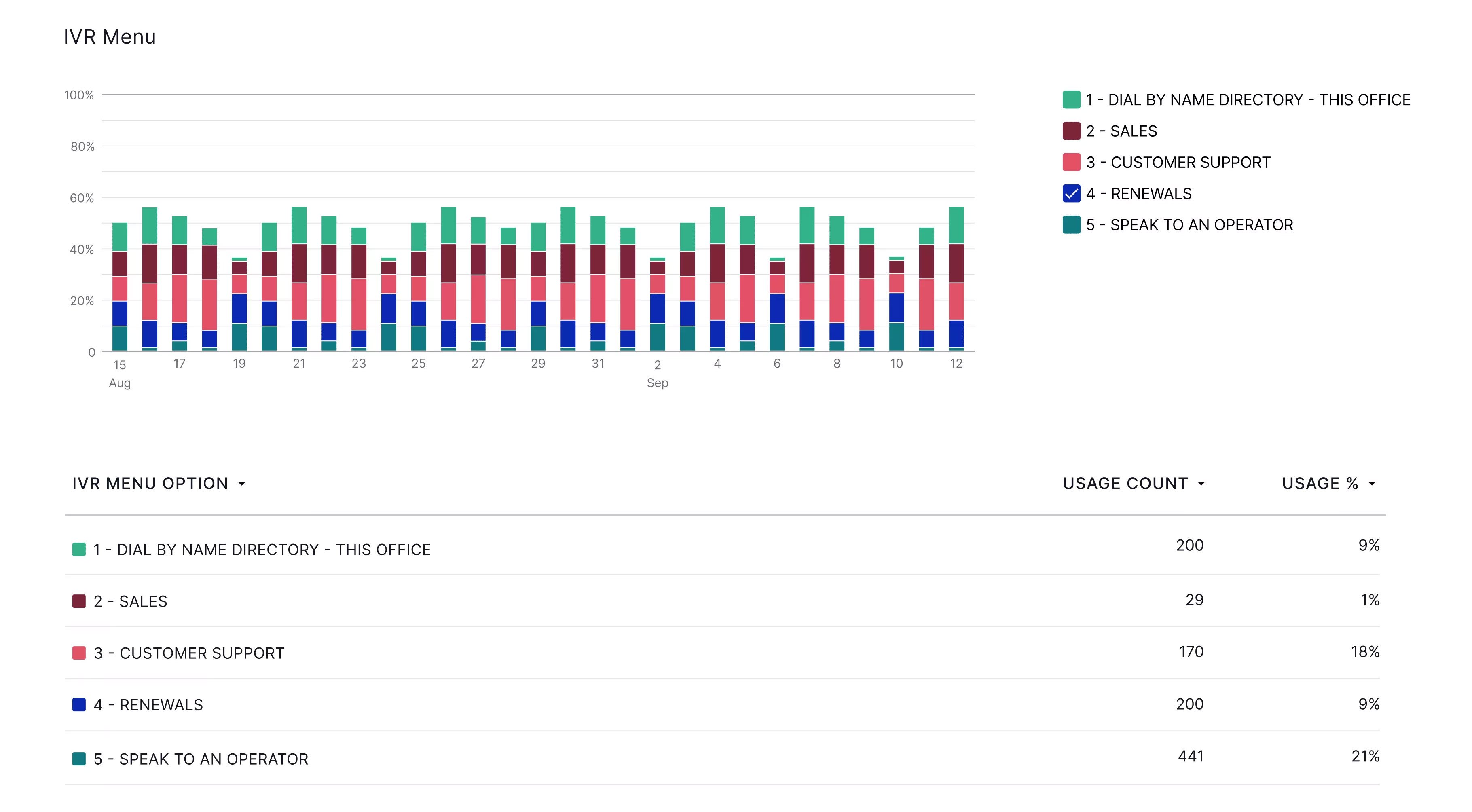
Dialpad offers a variety of analytics ranging from basic call logs to AI-powered sentiment analysis. However, there is conflicting information regarding which analytics tools are included with each plan. Although Dialpad’s pricing page says all AI Voice plans include basic real-time analytics, we were told that no real-time analytics are included with any Dialpad AI Voice plans.
That said, all Dialpad AI Voice plans do include basic call history data like:
- QoS and device usage reports
- Call date, type, participants, phone numbers, and duration
- Number of missed, transferred, abandoned, and answered calls over a custom date range
- Number of callbacks requested
- Interactive heat map of call volume trends
- Call Journey tool monitors individual call paths, including call transfers, call queues, IVR interactions, etc.
Aircall Analytics
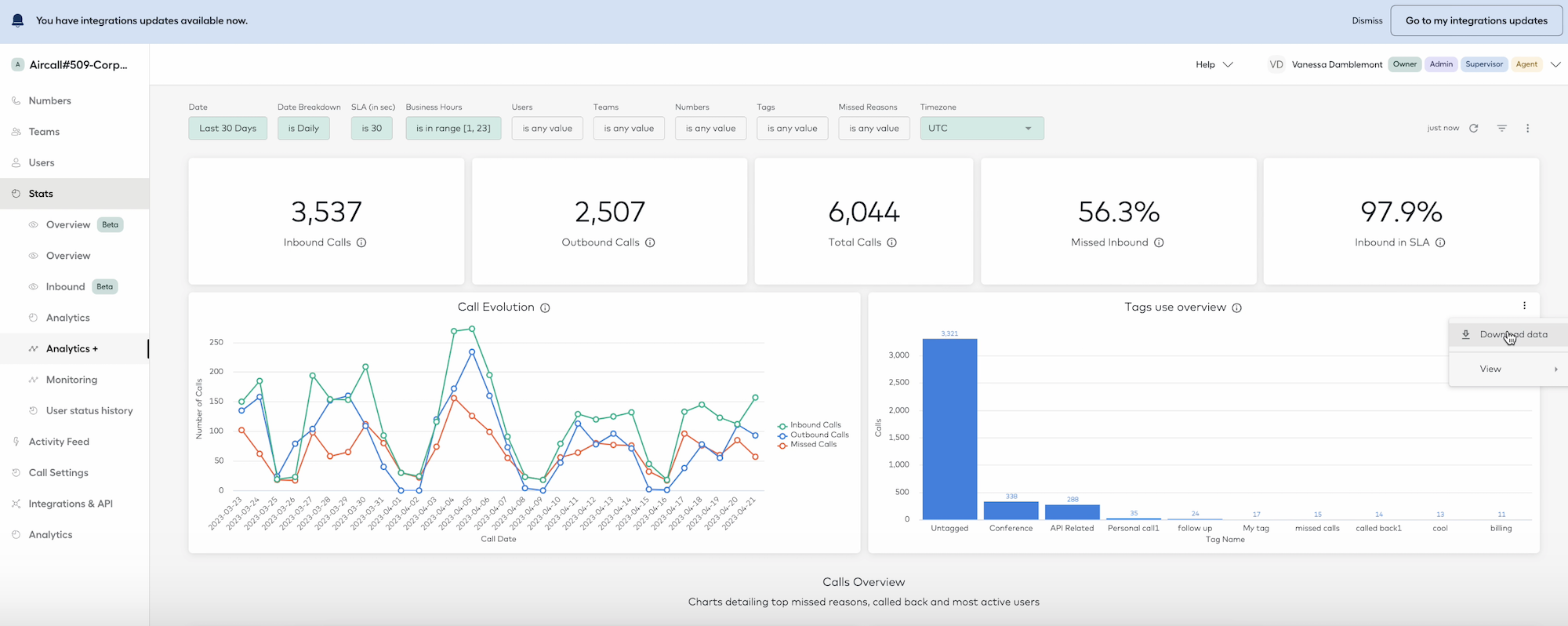
Aircall provides basic, advanced, and add-on analytics for real-time and historical KPI monitoring.
- Activity Feed: Live call center activity monitoring lets admins view current agent statuses and the amount of time agents have spent in that status, real-time call queues, average call wait time in the past hour, and the number of missed calls in the past 30 minutes. Admins can access call monitoring tools and provide in-call coaching via call whisper
- Historical Analytics: In addition to call log (call history) data, review KPIs like average call duration, inbound/outbound call volume, average speed of answer, missed call percentage, average wait time, call abandonment rate, total talk time, after-call work time, and more. Filter by timezone, department, date range, agent, phone number, call tag, etc.
- Analytics+ Add-On: View interactive data reports with charts/graphs, drill down data, export/share reports, review call trends and most popular call tags, and see KPIs for specific time zones, users, teams, and phone numbers. KPIs are automatically refreshed every hour, and the interactive call evolution view shows how your call center activity has changed over a specific time period. Custom KPIs/reporting are not available.
Winner: Aircall
Aircall wins for its inclusion of real-time analytics through its Live Activity Feed, giving supervisors live visibility into agent status and queue performance which is something Dialpad lacks entirely in its AI Voice plans. This makes Aircall the better choice for teams that need to actively monitor and manage live call center operations.
Aircall vs Dialpad: Integrations and APIs
Summary: Although both Dialpad and Aircall offer extensive third-party integrations, Aircall provides pre-built integrations with 100+ platforms and advanced CTI screen pops
Aircall Integrations
Aircall integrates with over 100 third-party tools, including:
- CRM Tools: Salesforce, HubSpot, SugarCRM, Zoho CRM
- Helpdesk Tools: HappyFox, Freshdesk, Help Scout, Intercom, Zendesk, Microsoft Dynamics
- Productivity Tools: monday.com, Slack, Zapier, Microsoft Teams, Slack
Dialpad Integrations
Dialpad integrates with top platforms like:
- CRM Tools: Salesforce, ServiceNow, Bullhorn, HubSpot, Zoho CRM,
- Helpdesk Tools: Zendesk, Autoreach, HappyFox
- Productivity Tools: Zoom, Google Workspace, Zapier, Microsoft Teams,
Winner: Aircall
Aircall wins for its broader library of over 100 pre-built integrations and more advanced CTI features like screen pops, making it easier to connect with a wider range of business tools out of the box. This gives teams more flexibility and faster access to caller context during interactions.
Aircall vs Dialpad: Customer Service, Security, and Reliability
Summary: Dialpad offers 100% uptime, 24/7 phone and chat support, a better online knowledge base, and premium add-on support options. Aircall has a 99.95% uptime and does not offer 24/7 support to any users–not even those on the most expensive plan.
Aircall Security+Support
Aircall is powered by AWS, has 7 globally redundant data centers, and is HIPAA, GDPR, SOC 2, PCI, and ISO 27000 compliant. Aircall offers end-to-end encryption, a 99.95% uptime, and 24/7 network monitoring with live updates on its status page. All Aircall plans include two-factor authentication, roles-based permissions, and Google Sign-In access (though SSO is only available on the Custom Plan.)
Although all Aircall plans include access to customer support via phone, email, and chat, 24/7 support is not available for any plans (although the Custom Plan does provide priority support.) Additionally, dedicated account managers and personalized onboarding sessions both require 15-user minimums. While Aircall does have an online knowledge base, it is poorly organized and contains limited, generally unhelpful feature tutorials.
Dialpad Security+Support
Thanks to its multi-tenant architecture and geographic redundancy, Dialpad offers a 100% uptime for Enterprise users–but does not include a guaranteed uptime for cheaper plans. All Dialpad Voice AI plans include end-to-end encryption, SSO, automatic spam blocking, HIPAA and GDPR compliance, meeting locks, and user access management. Custom data retention policies are available.
All Dialpad users have access to an extensive online knowledge base, the community forum, and 24/7 live multilingual chat support. Dialpad Enterprise plans include a dedicated support number and account manager, priority routing, and 24/7 support via phone, multilingual web ticketing, or multi-lingual chat support. Unlike Aircall, Dialpad offers several premium (add-on) support options including a technical account manager, end user training, direct access to tier 2 support, and faster resolution times.
Winner: Dialpad
Dialpad wins for offering 24/7 phone and chat support, stronger uptime guarantees for Enterprise users, and premium support options, plus a much more helpful online knowledge base. Aircall, by contrast, lacks round-the-clock support even on its highest-tier plan.
AI Capabilities
Summary: Dialpad provides real-time AI call transcription, speaker differentiation, sentiment analysis, and smart suggestions like action items and key moments. It’s key to note that these are all included with every AI Voice plan. In contrast, Aircall provides a handful of comparable AI features, but they’re only granted through a paid add-on and do not include real-time transcription.
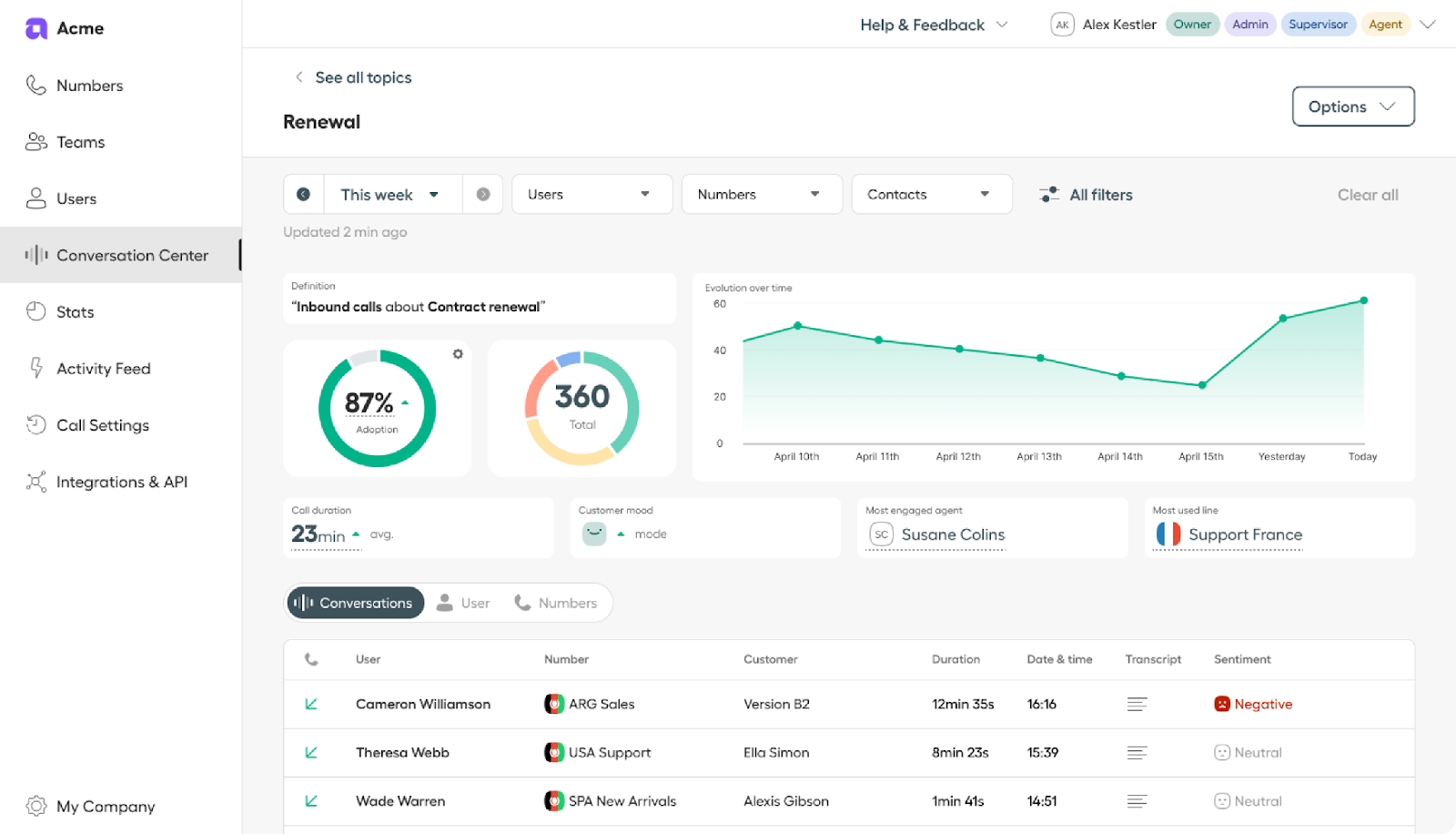
All Aircall users get access to standard call recording and transcription features, with up to six months of call storage (unlimited on the Custom Plan). Recordings can be paused, shared, and downloaded, and transcripts are available post-call. With the AI add-on, users can view call summaries, access talk-listen ratios, adjust playback speed, and highlight key topics. However, features like speaker differentiation and transcription customization are only available with this extra package, and AI-generated insights are not provided in real time.
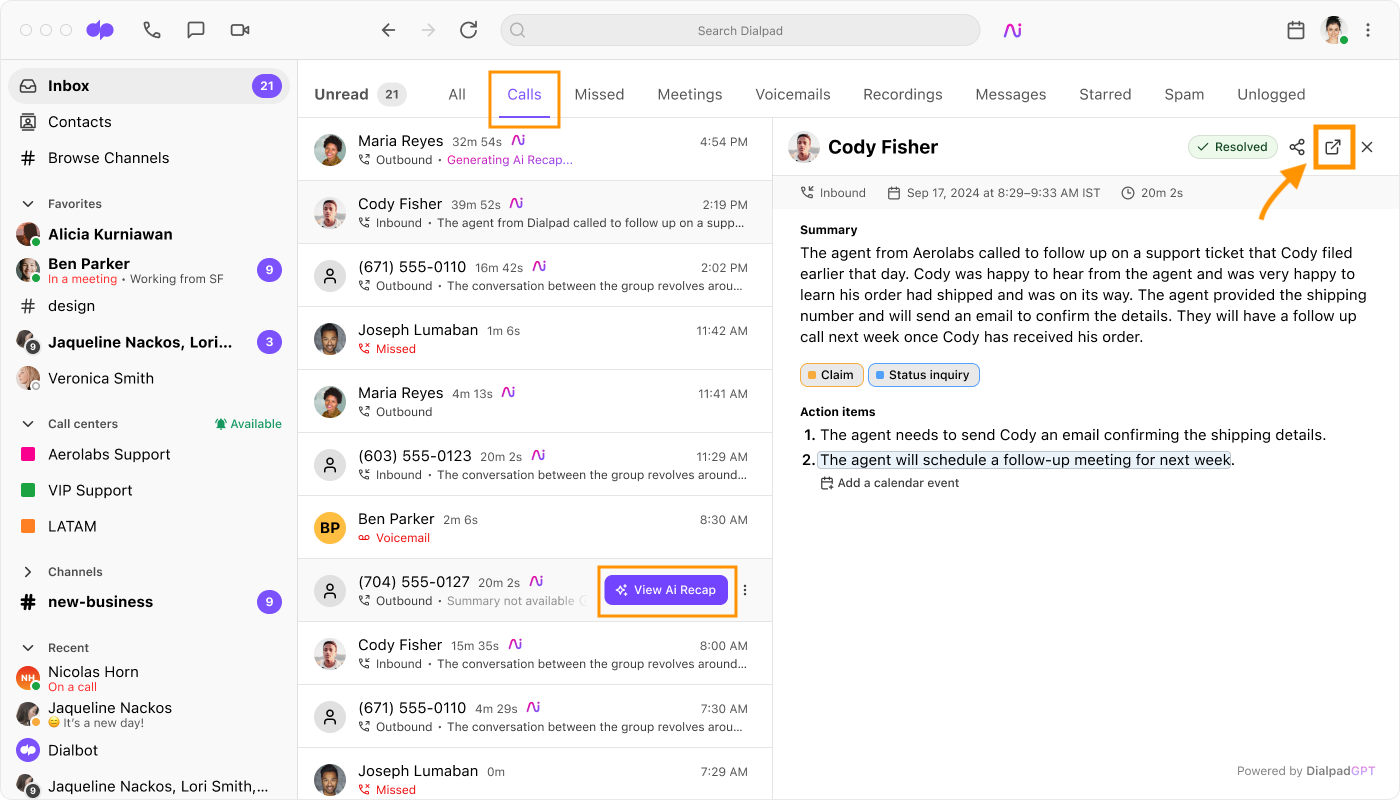
On the other hand, Dialpad includes full AI functionality in all plans without requiring an upgrade. Transcriptions are generated in real time with speaker labels and searchable keywords. Users can add comments directly to call recordings and transcripts, access summaries and action items immediately after calls, and review sentiment trends over time. Admins can manage these tools from the Call History tab or Agent Inbox, offering a much deeper level of automation and insight than Aircall currently provides.
Winner: Dialpad
Dialpad takes the lead with real-time AI transcription, sentiment analysis, and AI-generated action items available on all plans. Aircall does offer AI tools like summaries and talk-listen ratios, but only as a paid add-on with fewer real-time capabilities.
Aircall vs Dialpad: Pros and Cons
Here’s what we like and dislike the most about Dialpad and Aircall:
Aircall Pros
- Conversation Center: Unified and user-friendly interface that stores and provides one-click access to all call recordings+transcriptions, voicemail messages+transcriptions, and agent call notes in near real-time. Filter/sort by call type, phone number/line, agent, call duration, call date/time, call tags, and more. Users with the AI Aircall add-on can also view call summaries and topics, sentiment analysis, talk-listen ratios, and other AI-generated call data in the Conversation Center
- Shared Call Inbox: Company-wide, team-wide, or private shared inboxes that allow all members of a call group or team to review and manage call assignments, missed calls, follow-up calls, tasks, call tags, shared contacts, and more. Within the Shared Inbox, agents can add comments to calls, share detailed call notes with other agents, turn on push notifications, and even initiate real-time warm call transfers
- Integrations: Because Aircall lacks some essential collaboration features, it offers extensive pre-built third-party integrations with real-time CTI screen pops for in-call access to key customer data
Aircall Cons
- Conference Calling: Aircall conference calls have a maximum of 5 participants and the conference calling feature is unavailable on Apple iOS mobile devices (iPhones)
- Team Collaboration Tools: Aircall does not offer native chat messaging, video conferencing, file sharing, or whiteboard features. Though integrations with Microsoft Teams and Slack are available, Aircall does not integrate with Zoom–meaning many users will need to purchase an additional web conferencing app
- High Cost: With plans starting from $30/user/month (with a three-user minimum) Aircall is one of the most expensive business phone systems in the SaaS space. Given that Dialpad's cheapest plan costs half of that, has a 1-user minimum, and includes video calling and collaboration tools that Aircall doesn’t provide on any plan, Aircall offers little overall value for money
Dialpad Pros
- Business Texting: Dialpad offers extensive business text messaging capabilities including delivery status updates, shared line messaging, group texting for up to 25 users, international texting to 50+ countries, and more
- Premium Support: Dialpad offers 100% uptime, 24/7 live chat and phone support, and a scalable selection of add-on premium support packages
- Team Collaboration Tools: All Dialpad Voice AI plans include access to an advanced suite of team collaboration features including video conferencing, file sharing, team chat, and Miro whiteboard integration
- Scalability: Dialpad offers a high level of scalability, allowing users scale from an affordable business phone system for $15/month all the way up to an enterprise-level omnichannel contact center with AI customer analytics, workforce management tools, and in-call coaching
Dialpad Cons
- Low Participant Capacity: Although Dialpad Meetings includes advanced features like real-time meeting transcription and end of meeting reminders, it still limits the maximum number of participants to 10. To access the higher meeting participant cap of 150, users must pay $15/user/month for the Business Meetings plan
- Learning Curve: Dialpad offers a competitive suite of features, but the platform isn’t as intuitive as competitors and comes with a longer learning curve. We suggest taking advantage of Dialpad’s extensive online knowledge base–or paying more for custom end user training
- Limited Analytics: Dialpad AI Voice comes with limited analytics compared to Aircall and other competitors, especially when it comes to real-time SLA monitoring. However, Dialpad’s contact center solution offers AI-powered analytics with custom reporting
Aircall vs Dialpad: Which Provider is Right for Your Business?
Below we’ve outlined who should–and should not–use each call center solution.
Use Aircall If:
- You’re a new or small call center owner with in-house agents that communicate with customers almost exclusively via voice calling
- You want to keep using the third-party business communication tools you already have, but need to streamline then into a unified platform with basic call center functionality
- You have a high outbound daily call volume but are losing valuable time to manual dialing, lead list cleanup, and post-call work. You’re ready to switch to a platform with a built-in automated power dialer to increase conversions and improve lead list penetration
Avoid Aircall If:
- You need call center software with built-in UC and team collaboration tools like chat messaging, web conferencing, and file sharing
- You’re on a tight budget and need a business phone system with low/no user seat minimums and excellent value for money
- Your call center agents are mostly remote and on-the-go, meaning they need access to a full-featured mobile version of their business phone system
Use Dialpad If:
- You need a full-featured Unified Communications platform with voice calling, SMS, video conferencing, virtual faxing, and built-in team collaboration tools
- Your current agents are overburdened, but you can’t afford to hire additional reps–so you need to leverage AI to optimize business processes and eliminate busy work
- You plan to scale from a small business phone system to an enterprise-level omnichannel contact center solution in the future–and don’t want to have to switch to another SaaS provider
Avoid Dialpad If:
- You want a simple, no-frills business phone system with basic call management features that don’t require a lengthy onboarding process
- You need extensive and customizable real-time KPI monitoring to optimize available agents and keep call wait times low
- You need a video calling tool with a high participant capacity, built-in screen recording, a minimum meeting duration time of at least 8 hours
Interested in Dialpad and Aircall alternatives? Check out our other head-to-head business phone system comparisons, or see our call center software review page to explore even more providers.



